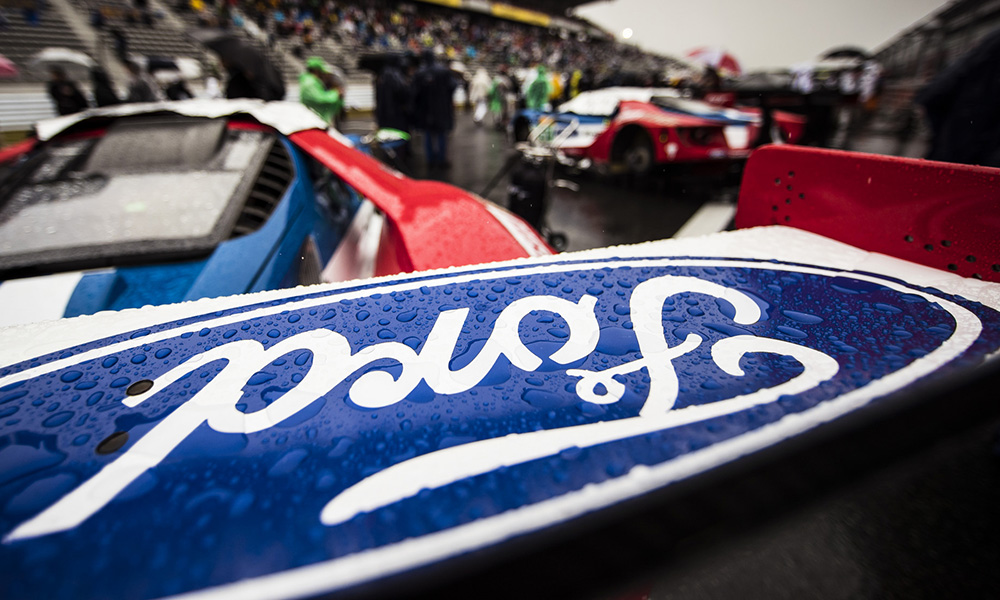
Photo: Drew Gibson/Ford
Ford has continued its push for a common set of global prototype regulations that would allow the American manufacturer to step up to the top levels of both the FIA World Endurance Championship and IMSA WeatherTech SportsCar Championship.
Talks have continued this week at Sebring between manufacturers and officials from the FIA, ACO and IMSA on the concept of a single platform that would debut by as early as the 2020-21 WEC season, and potentially by 2021 in the WeatherTech Championship.
With the factory Ford GT program currently confirmed through the 2018-19 WEC and 2019 WeatherTech Championship seasons, Mark Rushbrook, Ford Performance’s new Global Director of Motorsports, admits that a move to prototype racing remains a key discussion point.
“That’s what we’re looking at,” Rushbrook said. “What makes sense, whether it’s continuing the GT program, whether it’s a prototype program, whether that’s in IMSA with DPi or WEC with LMP1 or ideally [both].
“What we would like as a global company, candidly, is a global program just like the GT so we can take the same car and same investment in the car design and development and apply it racing in IMSA and WEC around the world very efficiently.
“That’s what ultimately we would like to see in prototype. That would then make us more interested would be a common set of rules so that we could take that same car and run it in WEC and run it in IMSA and run three or four cars at Le Mans.”
While discussions are understood to not have made significant headway in the latest manufacturer meeting on Thursday evening, Rushbrook believes there is still a common goal from the majority of parties.
“Most people have the same goals, especially the sanctioning bodies between IMSA and WEC and ACO and FIA that would like to get to the common set of rules,” he said.
“But a lot of manufacturers approach their racing globally like we do.
“I think there’s a lot of people trying to push it in that same direction, it’s just a matter of can it all be boxed properly.”
Hybrid Debate Among Question Marks
One of the biggest holdups, Sportscar365 understands, deals with hybridization, with the FIA and ACO’s latest proposal aiming to retain current LMP1 performance levels, potentially with similar levels of hybrid power seen today.
In light of Ford’s recent electrification plans for the road, Rushbrook stressed the importance of at least some sort of hybrid technology in the new-gen platform.
Ford’s view, however, is believed to differ from the majority of current IMSA DPi manufacturers, who are in favor of remaining with a more cost-effective approach, potentially without a hybrid component at all.
“It certainly makes sense to help with what our future cycle plan is with our road cars to have hybridization and/or full electric as part of our motorsports plan moving forward,” Rushbrook said.
“We’d like to see at some point, when it makes sense either in prototype or in GT, some level of hybrid so that we have the opportunity for that transfer.
“Whether it’s hardware or software, it’s all a good opportunity for that transfer.”
Rushbrook said he would like to see a mix of common/spec and bespoke components, in order to control costs yet also help drive development to its lineup of production vehicles.
“That’s part of that discussion in finding that balance,” he said. “If you make it totally wide open you’ll have the LMP1 budgets of today and there’s no progress made there.
“If you go everything fully spec then it’s obviously gone too much.
“It’s finding that balance of where can you still have the innovation but still have the costs at a reasonable level.”
While it’s still unclear if the FIA/ACO and IMSA will find common ground for a shared platform, Rushbrook has ruled out Ford running a dual LMP1/DPi program utilizing different regulations.
“If we don’t get a common set of rules, then I think it would be a hard decision of whether we do one or the other or none,” he said.
Should it commit to a prototype effort, Rushbrook hasn’t ruled out an extension of its current Ford GT program to help “bridge the gap” prior to the launch of the new regulations in 2020 or 2021.
“If it makes sense to bridge into something, either as a factory program or a customer program, then yeah,” he said.

























